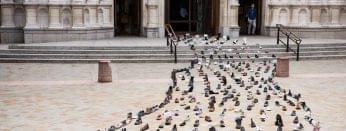CSAN trustee Bishop John Arnold was among Christian religious leaders who signed a letter to Peers ahead of their consideration of MPs’ most recent amendments to the UK Nationality and Borders Bill. This latest letter followed one to MPs a week earlier, as the passage of the Bill comes towards a conclusion. In a parallel move, the Lead Bishop for Migration of the Catholic Bishops’ Conference of England and Wales, Rt Rev Paul McAleenan, issued a statement criticising the recent agreement between the Governments of the UK and Rwanda to house some migrants to the UK in Rwanda while their UK asylum claim is processed, with, according to the UK Home Secretary, ‘up to five years of training to help with integration, accommodation, and healthcare, so that they can resettle and thrive.’
Many aspects of the UK’s New Plan for Immigration, and the Nationality and Borders Bill, have drawn fiercely negative criticism from many charities and commentators, for diminishing the UK’s role in fulfilling international obligations to refugees, in creating additional and unreasonable barriers to asylum in the UK, and for doing little or nothing to reduce modern slavery and human trafficking. The Government has remained resolutely firm on its proposals to reduce immigration, increase selective entry, end freedom of movement and increase spending on border controls, which were key parts of its 2019 manifesto commitments (‘overall numbers will come down’), while in 2022 extending temporary resettlement for an uncapped number of refugees from the war in Ukraine for up to three years initially. Over 200,000 UK households signed up to host one or more refugees once the Government announced its Homes for Ukraine scheme.
The UK Government has publicly criticised the international systems and conventions for protecting refugees as ‘broken’. But the UN Refugee Agency, UNHCR, has in turn critiqued the Nationality and Borders Bill for ‘penalising most refugees arriving in the country’. Last week a majority of MPs disregarded the advice of churches, charities and UNHCR by continuing to back the Government’s proposals.
The passing of the Bill will not be the end of this story, as record numbers of immigrants attempt the Channel crossing, thousands of refugees are already in the UK awaiting a decision on their claims, and the detailed implementation of new legal provisions will need to be set out in subsequent regulations and practice.
Full text of letter to Peers, 25 April 2022
We are writing as a group of Christian leaders, from denominations and traditions across the UK, ahead of the debate on the Nationality and Borders Bill in the House of Lords this week. We want to take this last opportunity to make it clear where we stand on the Bill, and to urge you to support the continued inclusion of amendments previously made to the Bill in the House of Lords. Peers have consistently supported changes to the Bill to bring it in line with international convention, and demonstrate compassion and care for our common humanity. Being resolute about these safeguards is rightly the role of a revising chamber.
Faith groups have been outspoken on our concerns about the Bill. In February, over 1000 faith leaders from communities across the UK joined us to express how horrified and appalled we were about its potential repercussions. We have made it clear how we feel the Bill fails to uphold the principles and values of the UK by creating hostility and fostering discrimination against some of the most vulnerable people in the world. We hope that our vocal concern might encourage you to continue to seek changes even at this very late stage.
Only in the last few weeks we have witnessed the seemingly limitless compassion and commitment shown by UK citizens as they have welcomed Ukrainian refugees into their lives and homes. Yet the Nationality and Borders Bill directly contradicts this generosity of spirit. We find it challenging to understand how the policies within the Bill will work in practice, except that they will cause hardship, criminalise innocent people and fracture families. The government’s recently announced plan to export some asylum seekers to Rwanda only compounds our sense of concern, representing an abandonment of the UK’s responsibilities and a denial of the rights and dignity of refugees.
In particular, we support amendments to the Bill made to expand and protect family reunion rights, to enable asylum seekers to work after waiting six months for their application outcome, to establish a target for resettlement and to amend the two-tier system proposed for asylum seekers. Each of these amendments recognises that the trauma and need of a person seeking asylum should be prioritised, and that we should do all we can to offer opportunities for people and families to restore their lives in a place of safety. In supporting these amendments, we urge you not to vote against the lives of vulnerable children, men, women and families who are in desperate need of our support.
In this Easter season, as Christians we celebrate new life and new hope. Our faith tells us that our God-given hope in new life should influence the way we treat our neighbour, wherever they come from. As the Nationality and Borders Bill comes before you once again this week, we ask you to consider how your vote demonstrates how you care for those most vulnerable in our world.
Recently, Church leaders have been criticised for joining the debate about asylum and immigration plans. But in the face of unfair and cruel proposals, to fail to speak out would be a denial of our gospel calling. The Biblical mandate is that righteous nations ‘welcome the stranger’. So, regardless of the outcome of this week’s votes, we will not stop advocating for love to be shown to our neighbour through the policies and practices in our asylum system. Churches across the UK will continue to come alongside those who remain in desperate need of our friendship and welcome.
We wish to encourage you in your role, and hold you in our prayers during this time.
With regards,
Bishop John Arnold, Roman Catholic Bishop of Salford
Dr Patrick Coyle, Chair, Cytûn – Churches Together in Wales
Revd Clare Downing, General Assembly Moderator of the United Reformed Church
Barbara Easton, Vice-President of the Conference of the Methodist Church in Great Britain
Revd Lynn Green, General Secretary, The Baptist Union of Great Britain
Revd Sonia Hicks, President of the Conference of the Methodist Church in Great Britain
The Most Revd Andrew John, Archbishop of Wales and Bishop of Bangor
Paul Parker, Recording Clerk, Quakers in Britain
Bishop Mike Royal, General Secretary of Churches Together in England
Most Rev Mark Strange, Bishop of Moray, Ross and Caithness, and Primus of the Scottish Episcopal Church





